I can't wait...Who, me?o
Going to start working on the update now!
Novum Romanum Imperium -- A Tuscany DW AAR
- Thread starter Avindian
- Start date
-
We have updated our Community Code of Conduct. Please read through the new rules for the forum that are an integral part of Paradox Interactive’s User Agreement.
You are using an out of date browser. It may not display this or other websites correctly.
You should upgrade or use an alternative browser.
You should upgrade or use an alternative browser.
Chapter 26, part 1: The War of Retribution
2 June, 1588, Balcony of the Castle St. Maso, Rome
The new Emperor of Tuscany, Leo III, was unlike any Emperor before. He'd had a real role in ruling the Empire from Constantinople, and was perhaps the best prepared of all the Emperors of Tuscany to deal with the crisis at hand. His father, Francis I, had been assassinated by the hand of a Castillian. His people were both grieving and demanding vengeance, as indeed he was. However, he could not declare war on one of the most powerful Christian kingdoms without serious thought and preparation. His first speech needed to do two things: reassure the crowd that the slight would not be forgotten and restore order.
"Citizens of the Empire of Tuscany, I only wish I could address you under different circumstances. I am aware that Francis I was not just my father, but in a very real sense, your father as well. It is a tragedy for the entire nation. I have been deeply moved by the outpouring of support from each and every one of you; they have aided me greatly in my time of need.
"Let me assure you, first of all, that your daily lives will be the same under me as they were under my father. Foundries will continue to smelt metal, farms will continue to produce food, banks will continue to lend money, and nobles will continue to serve their people. Nothing will change. I have proclaimed today and tomorrow a day of mourning; however, we must not show weakness in a time of adversity. My father valued tradition over all else; we must show him the same respect, even as he has passed on to his reward.
"Of course, this tragedy was no accident. Many of you have heard the rumors that the Emperor's assassin was from Castille. I understand and sympathize with your anger, but we must conduct a thorough investigation. We cannot make a rash decision in our time of great emotion and passion. I do, however, guarantee that those responsible shall not evade justice, whether they are individuals acting alone or soldiers supported by a foreign enemy. We will bide our time, and when the people of Tuscany strike at our enemies, it shall be as God's own thunderbolt! Life can and must go on, but for the enemies of the people, it will not go on for much longer. Glory to Francis I and the Empire of Tuscany!"
The applause was faint, but Leo III did not take offense; many were still coming to terms with a new Emperor with little or no warning. Day of mourning or not, Leo III still had work to do, and now addressed a meeting of the Imperial Council.
"My lords, we have jobs to do. I am making no major changes to our most important offices. I have been very pleased with the work of Chancellor Gathenhielm, Marshal van Dijk, and Foreign Minister Barberini and see no need to replace them. All of you have my complete confidence and I look forward to working with each of you in private. I do have two new appointees, however. Until my son, Pietro Leopoldo, is old enough to rule in Constantinople, I am appointing Julius Tullius Cicero his Regent there. He was a tremendous help to me during my rule there, and I have no doubt he will do the same for my son.
"The other new office will be Inspector-General of the Empire. Somehow, one of our enemies penetrated the most supposedly secure part of our Empire; the capital. The Inspector-General will not only be in charge of the investigation into the assassination, but will have carte blanche to do whatever he needs to ensure that security is restored. He will have the military rank of Colonel, and will also be responsible for the Guards regiment in the Imperial Palace as well. This office, I hope, will only be temporary, but I fear it may become permanent.
"For this office, I am appointing the Archduke of Africa, Drusus Germanicus."
This was completely unexpected by everyone present, most of all Drusus. He'd never quite gotten along with Francis I, and had been threatened with jail multiple times for his outspoken opposition to the Emperor's elimination of the Senate. While he participated in the ceremony shortly before the Emperor's death, he was decidedly unenthusiastic. He knew he might lose his patent of nobility if he defied the will of the Emperor and his fellow nobles, and his family's honor would be forever tarnished, so he kept his peace.
The Emperor addressed Drusus. "My friend, I know you and my father were not the best of friends. That is, if anything, an understatement. However, it is your candor and integrity that I need most. You are the only one I can trust with the authority to do what must be done. You are reluctant to accept, I know, and it is for that reason that you are the only one qualified. I expect the truth, and I can count on you to give it to me, whether I would like the answer or not.
"I do wish to make something very clear, however. I believe my father was right to abolish the Imperial Senate and I cannot and will not reverse his decision, nor will any of my successors. A republic is fine for Venice, a small island nation. It is not appropriate for a mighty Empire such as ours, and I will not tolerate republican sentiment. Republicanism, in any form, is treason. I will not hesitate to imprison or, if necessary, execute, anybody who openly foments rebellion or revolution in my Empire. Do you understand?"
Drusus hesitated for just a moment. The responsibility he'd been given was awesome, and he could very easily control the investigation and eliminate a political enemy, if he so chose. He knew that he himself might be considered a prime suspect if he weren't just landing in Rome at the time of the assassination. The Emperor was already dead when his ship docked. If he accepted the assignment, he would once and for all be forced to renounce republicanism, one of his dearest principles.
As if the Emperor sensed the internal struggle, he made one last point. "I know you are a man of conviction, of courage, and of principle. You have been devoted to the ideals of republicanism since you came to Rome as your grandfather's successor in the Senate. If you do not accept this assignment, I offer you safe passage, out of the Empire, to any land of your choice, since if you do not accept, I will know your loyalty to your principles exceeds your loyalty to your homeland. What is your answer?"
Drusus had been neatly trapped, and he knew it. Either he was a patriot or a republican, but in the eyes of Leo III, he could not be both. Practically speaking, it wasn't really a choice at all. Exile would probably destroy his family's honor once and for all. His son, named for his great grandfather and grandfather Andreas Gaius Germanicus, was a child, ten years of age, and the scandal would cost him more than it ever would his father. He nodded acceptance.
Leo III was magnanimous in victory, and instead of gloating, shook his new Inspector General's hand. "You will be in Rome until your duties have been effectively discharged; you may wish to appoint a regent until your son is old enough to rule in your stead."
"I would choose Daoud Selim Iskander. He was a close friend of your father's, and I have grown to trust him. He is a foreigner, this is true, but he is a fierce Christian zealot and will do an excellent job."
Leo smiled. "I seem to recall another foreigner who did quite well despite his handicap. Iskander will be acting Archduke of Africa until your safe return. Please remind him that he is not a noble, however. I may consider a patent of nobility for him as a reward, if he does well."
"Very good, Emperor. May I begin my duties at once?"
"Of course, Inspector-General Germanicus."
"Excellent. Then I would begin the investigation with the man who had the most to gain with the death of Francis I.
"You."
--------------------------------------------------------------------------------------------------
1 April 1590, the Inspector-General's office
Despite his dramatic opening to his investigation, Drusus Germanicus was getting nowhere. Leo III had been taken by surprise, but recovered very quickly. He even congratulated Drusus on his choice of the prime suspect. However, as Marshal van Dijk and Commandant Bartolini verified, he wasn't even in Rome at the time of the assassination -- he was inspecting the Germanicus Academy for the Imperial Legions. Since there was a graduation of about 100 officers, there were plenty of corroborating witnesses.
He interrogated each one of the guards, but expected little from that as well. The Emperor had dismissed the guards to discuss something in secret with an important visitor, and all of them were in the guard barracks. This mysterious visitor seemed to be the key, but nobody could identify him (or her, Germanicus thought with disquiet). He'd accounted for the whereabouts of every government official in Rome, and none were in or around the palace at the time of the Emperor's murder.
He'd tried to get some answers from the Castillian Ambassador to Tuscany, but like most diplomats, he said a lot without saying anything at all. Foreign Minister Barberini had used some of his agents in the Embassy to try to get an answer, but while the blade was identified positively as Castillian, the steel in Hispania had always been exceptional, and even the Emperor himself boasted a sword made from Spanish steel.
As he grew more and more frustrated, Chancellor Axel Gathenhielm entered his office.
"Good afternoon, Drusus. You look troubled."
Drusus looked up and smiled briefly. "Axel, my old friend, you're absolutely right. With the Castillian ambassador stonewalling me and no real suspects in Rome, I must confess I've got little idea what to do next. What have you been working on?"
Axel showed him the new decree from the Emperor.
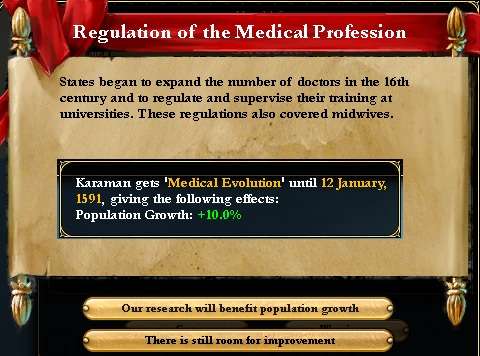
"The Emperor wants to stimulate the doctors in Tuscany, and has established greater professional standards. It already seems to be having an effect in Karaman."
Drusus looked puzzled. "Karaman? Why would it first show up there, instead of somewhere in Italy, like Rome?"
Axel chuckled. "Rome may be the center of the Empire, but it isn't the entire Empire, my friend. I imagine the hospitals in Karaman needed more help, so the difference is more notable."
At that, Drusus stared off into the distance. "You're right, Axel. Rome isn't the entire Empire. I've been looking in the wrong damned place!"
There were ships in the harbor that night! Maybe one of them left!, the now-rejuvenated Inspector General thought.
He raced off to see the Emperor, leaving a confused Chancellor in his wake.
However, it remained to be seen whether he could finish his investigation in time.
--------------------------------------------------------------------------------------------------
4 April 1591, Foreign Minister Barberini's office
Giovanni Barberini wasn't sure what to do. The Emperor had insisted he pursue a new alliance for the coming war with Castille, but he was frankly not sure where to look. The only countries powerful enough to make a difference were France, Austria, Muscovy, and the Ming Dynasty in China. Ming was too far away, France might side with Castille in the coming war, and Austria was certainly in no mood to sign any kind of agreement with Tuscany. That left Muscovy, but all of his attempts were being rebuffed.
At least domestically, things were going on well. New lands were becoming core territories of the Empire: Antalya and Sivas were the latest to become historically Tuscan. The war with the Timurids was going nowhere, quite frankly, because the only Timurid province that still bordered Tuscany was Beirut, and that was being occupied by Castille. Burgundy got Tuscany into a war with Benin, but to be honest, the Emperor had no intentions providing concrete support, so there were two wars, but no soldiers at risk. Perhaps the best kind of wars, Giovanni mused to himself.
A knock at the door announced the arrival of the Ambassador from Muscovy. "Sergei Ivan'ich, how are you this afternoon?"
"Very well, Giovanni. Very well indeed. I have good news for you, my friend."
"Oh?"
"Yes, I have spoken with the Tsar, and he wishes to renew our alliance with you!"
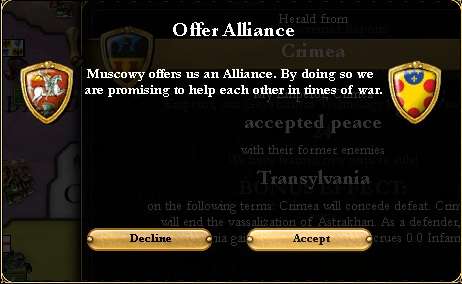
"That is wonderful news indeed. I must speak to the Emperor, naturally, but I have no doubt that I will return with his signature in a matter of hours. Would you like to wait here, or perhaps you'd like to come with me?"
"Here is fine. However, I must ask something rather... sensitive."
At this, Giovanni's mood of jubilation darkened a bit. "Yes, what is it, Sergei?"
"It is rumored you are considering war with Castille over the death of your Emperor. Is this true?"
"I am not a military man, Ambassador, and I do not know what plans they make."
The Ambassador smiled enigmatically. "Of course you don't, Minister. However, I must caution you that it is very unlikely that we will answer a call to arms in such a war. Please convey this to your Emperor as well."
"Might I ask why?"
"You may, but I have no answer -- I was only instructed to give you the warning when I made the offer. I could ask Moscow, but that would take some days. What would you prefer?"
Barberini paused. If he asked for clarification, the Tsar might be offended and retract the offer. If he didn't, the alliance might be a paper one only. He weighed the pros and cons, but realized the most important asset Moscow could provide was keeping France out of the war, whether or not Muscovy actually answered or not.
"No, that is not necessary. I will speak to him at once and return with his answer. I think you will be pleased."
"Very well. I shall anticipate your return with great interest."
--------------------------------------------------------------------------------------------------
27 July 1591, Castle St. Maso, Rome
Drusus Germanicus was puffing with exertion. He'd just returned the previous night with some startling news, but too late to speak with the Emperor. As soon as he'd woken that morning, he ran as fast as he could to the Imperial palace -- a not-insignificant five miles from his home -- hoping to meet the Emperor before any war was declared.
Marshal Karel van Dijk greeted him outside the Emperor's audience chamber. "Drusus, you look exhausted. Any news on the investigation?"
"Yes, Karel. Could I see the Emperor before you, my friend? I know you are to update him on preparations for our war, but I fear war might be a mistake."
The Marshal was caught off guard. There had been absolutely no sense from any of their letters between one another that he was close to a conclusion for the investigation. "If you think it's that important, by all means you may proceed, but I think you might be better served to wait until I've completed my briefing. Remember his background in military affairs; I think he honestly looks forward more to his morning briefings than his breakfast. You might put him in a foul mood if you preempted me.
Drusus thought for a moment. "We aren't declaring war today, are we?"
The Marshal smiled and shook his head. "I should hope not."
"Then I can wait. Perhaps I could accompany you? I do know the land quite well in Diamentia."
"An excellent suggestion! I would be honored."
As the two entered the room, they found Leo III talking with the Foreign Minister, Giovanni Barberini.
"Drusus! What an unexpected surprise! Are you here to provide some logistical support with your Archduchy or do you have results of the investigation?"
Drusus glanced at the Marshal, who shook his head slightly. "The former, your Imperial Majesty, but I would like to speak with you after your briefing about the investigations."
"Of course, Inspector-General. Everybody, please sit down.
"Giovanni has informed me that Muscovy has not changed their mind. They will not support us in any action against Castille. All of our vassals, Savoy, and Burgundy have all promised their enthusiastic support. We've done all of this as surreptitiously as possible, you understand. No high-level meetings, all the usual tricks."
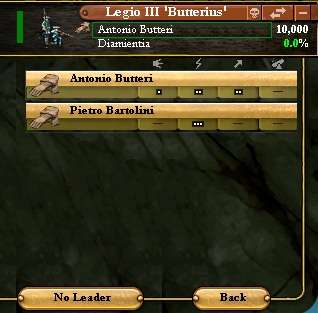
The Foreign Minister took his cue. "For some reason, the Tsar is convinced he's already at war with somebody else. I fear for his sanity, but of course we cannot antagonize a close friend. I recommend we issue a general call to arms anyway, in hopes he will change his mind." [1]
Drusus Germanicus looked puzzled. "If they are going to say 'no', why even bother? Shouldn't we leave them out of it?"
"No, Drusus. The problem is this. If we don't call Muscovy, they will feel insulted that perhaps they aren't our true allies. If we have to call each power individually, that will take a lot of time, and may cost us in the long run. I'd rather give them the chance to deny us, in all honesty. They almost certainly will, but if worst comes to worst, we can always look elsewhere. I am doubtful France will intervene, even without Muscovite support."
"As you say, Giovanni."
The Emperor was pleased at this exchange. He liked the fact that Drusus felt comfortable enough to question a decision, without being too aggressive about it. His counsel would be invaluable in the coming days.
"Marshal, would you begin the briefing of your latest movements?"
"Of course, Emperor. As Inspector-General Germanicus will verify, a few days ago, two more Legions landed in Diamentia. That gives us 30,000 soldiers there. I've also ordered the Fifth to move south to Hammah; although Mus is better defensively, we have more options in Hammah and can threaten two provinces simultaneously from there. We have one legion each in Tunis and Constantine. I am considering moving a legion closer to the border with Transylvania. As you know, they are staunch allies of Castille and do threaten Constantinople, albeit very indirectly.
"I've appointed two Generals; one will be stationed in Diamentia, the other in Tunis. The commander of the Eastern Theater is General Antonio Butteri. He is a direct descendant of General Eustachio Butterius, one of the Generals during our war with Siena, and the Sheriff Salvestro Butterius. Although his family has dropped the Latinization of their name, they have been loyal soldiers for generations. He will command the Third Legion, the Butterius legion, a symbolically important position, I think.
"The other commander, who will lead the Sixth Legion, is none other than the son of our Commandant, Pietro Bartolini. This is not nepotism; he was at the head of his class and was a legionary commander during our war with Morocco. He is perhaps one of our most experienced desert warfare soldiers."

The Emperor nodded. He knew both names and approved. He was a little antsy, however, wishing he could command himself, but he knew that while his son was underage, the nobles would never allow it. "Their objectives?"
"Bartolini will move East, taking Gabes. I've given Butteri a little more flexibility. Castille's armies have been spotted in his area, and I want him to decide whether he will concentrate or spread out."
"That is a sound plan, Marshal. Anything else I should know?"
The Marshal briefly thought, then shook his head. "No, Emperor. That's all for now. I'm not certain where I will place our fleets yet; at least one will support General Butterius. I will consult with the commanders of each Classis and decide from there."
"Fair enough. Thank you for another excellent briefing. You are dismissed, as are you, Minister Barberini."
Both bowed and departed. Then the Emperor turned to Drusus Germanicus.
"Now, my Inspector-General, you have news for me?"
Drusus swallowed hard. He knew the Emperor wouldn't be happy about what he had to say.
"I do. I've concluded the investigation and found the parties responsible. I don't think you'll be pleased, however."
Leo III frowned. "I see. Was Castille not to blame?"
"A Castillian was most definitely the assassin, Emperor. He was a lieutenant based in Alexandria. I checked the ship manifests and spotted his name immediately. A Juan Carlos Rodriguez. Somebody, it seems, had fed him the information that your father was going to declare war on Castille to reclaim the Holy Land. He decided to act based on that information."
"That is the very best of news, Drusus. Why would you think I would be displeased? Has Castille apologized for this insult?"
"No, your Imperial Majesty, and I'm not altogether certain they should. We were betrayed, Emperor Leo III. A Tuscan citizen was responsible for your father's death.
"Daoud Selim Iskander."
Leo III got very quiet. "Are you certain? How can this be?"
"Your father knew of Daoud's twin passions: making the Holy Land Protestant and liberating Alexandria. What he didn't know was how far Daoud was willing to go to achieve his goals. He'd been operating a terrorist network in Alexandria for years before he became Foreign Minister. At first, it was simple propaganda against the Ottomans and the Mamluks.
"When we didn't take Judea during the war with Morocco, however, he became bitter. I thought he just wanted to return to Egypt when he asked to become Governor of Diamentia. That was certainly true, but he also wanted to re-establish his contacts in Alexandria. One of these contacts provided the information to Lieutenant Rodriguez. In Daoud's defense, I don't think he expected Rodriguez to assassinate Francis I. I think his ultimate goal was to have the Lieutenant -- a well-connected member of the Castillian nobility, by the way -- talk to the King, and perhaps convince them to declare war on us, so we would not appear to be the aggressors.
"When Rodriguez said he refused to go any further with this information until he had confirmation, Daoud had the brilliant idea to have him spy in the Emperor's apartments. Daoud sent a letter to the Emperor, telling him a close friend was going to be in town, and might be able to provide some details on Castillian troop movements. To keep his source protected, Daoud insisted that the Emperor not be present, to make some excuse to sleep elsewhere that night.
"Francis I, as I'm sure you know, Emperor, was never one to delegate important decisions, and while he promised Daoud he wouldn't be present, he lied. He had no intention of letting the Lieutenant plant a note in his chambers, so he dismissed his guards and met with him in person.
"This fit in nicely with Rodriguez's plan. He never intended to talk to the King at all. He hoped by assassinating the Emperor, the plans to invade his home would die with Francis I. He actually wanted to leave a note asking for a private meeting anyway. The Emperor unknowingly obliged him, and well, you know the rest."
The Emperor said nothing for what seemed like an eternity. Drusus could tell he was barely controlling his rage.
"Do you have proof of all of this?"
Drusus nodded. "It was actually Iskander that came forward. I've spending the last while verifying his story, but it all checks out. Juan Carlos Rodriguez killed your father, but without the knowledge of anyone in the government of Castille. That is why I came so early to see you. I do not want to see a war for the wrong reasons, my Emperor."
The Emperor nodded wordlessly. Drusus was hesitant to prod, but there needed to be some kind of decision made, and soon. "What would you have me do now?"
Leo III blinked slowly. "Go speak with the Foreign Minister. I want an ultimatum drafted and delivered to the government of Castille, demanding the extradition of Juan Carlos Rodriguez. I don't care who he's related to. He needs to be punished. Make it very plain that the consequences for noncompliance will be very, very grave.
"As for Iskander, your duties, for now, are complete. I would advise you return to Diamentia and send him to me. I will speak with this... fool and decide what to do from there. Do you have any recommendations?"
Drusus shook his head. "It is you who were wronged, Emperor. You alone can decide his fate, and I will support whatever decision you make."
Leo III nodded. "Your support is most appreciated. You have done very well. I have a new assignment in mind for you, but not until your son is ready to take over in Diamentia. Have a safe journey, and make sure that Barberini knows exactly what he is to say. He is free to consult with me if any clarification is needed."
"Of course, Emperor. Thank you for your time, and I wish I had better news for you."
"So do I, Drusus. So do I."
--------------------------------------------------------------------------------------------------
11 August 1591, the Foreign Minister's office
Giovanni Barberini found drafting the ultimatum to Castille one of the most difficult documents he'd ever written. It took all of his skill. Still, he'd delivered shortly after meeting with Drusus Germanicus. The response was supposed to have been delivered 1 August. As an ominous reminder that the Empire took this threat seriously, Barberini had just delivered a note to the Embassy again, this time cancelling the Military Access Treaty. The Foreign Minister hoped that this might convince the King of the gravity of the situation, but he seriously doubted Juan Carlos Rodriguez would ever see justice. His spies had already told him that Rodriguez had been deployed to the New World as an administrator in the Castillian colony of Florida.
When he heard the knock at his door, he'd hoped it was the Spanish ambassador. Instead, he found a very pale and trembling Daoud Selim Iskander. Although the Foreign Minister knew exactly what had happened, he nevertheless found it difficult to believe his mentor could have set the events in motion which ended Emperor Francis I's life.
"Daoud, you look like you've seen a ghost. What happened?"
Daoud responded with a catch in his voice, "I'm here to say goodbye, perhaps forever. For my role in the Emperor's death, I am not to be executed or imprisoned. Instead, I am going to become a soldier. I will participate in every action my legion does, and if things seem too dull, I'll be transferred. If I survive the war, I can look forward to never seeing my home again; I am never to leave Rome again, and will have my freedom severely restricted within the city."
Giovanni was torn between sympathy for his friend and the crime he now knew his friend committed. As he was about to speak, Daoud raised his hand and shook his head. "My friend, I am grateful for the opportunity to prove my value to this Empire. I look so frightened because, if the truth be told, I've never been in a battle in my life. Fights, yes, but never a war. I am not an overly brave man and have never held a musket. Worse still, my compatriots will think I've been compromised if somebody recognizes me, and they may put a contract out on my head.
"It is what I deserve. The Emperor is an honorable man, and I cannot say I would have spared his life were our positions reversed. Farewell, old friend. I hope to see you again soon, but if I do not, God be with you."
"And with you, Daoud Selim Iskander. I think the Lord will keep you and protect you; I feel you have some part to play yet. Good luck, and safe journeys."
The two men embraced. Each felt he would never see the other again.
Only time would tell who was right.
--------------------------------------------------------------------------------------------------
18 November 1591, the Castle St. Maso, Rome
It was done. The Castillian Ambassador rejected the Tuscan ultimatum, first claiming total ignorance of the crime, then insisting that Rodriguez was nowhere to be found, and finally saying that no Prince of the blood would ever be handed over to foreign heathens. After trying a few last ditch efforts to assure Muscovite intervention, to no avail, Emperor Leo III handed the ambassador a declaration of war.
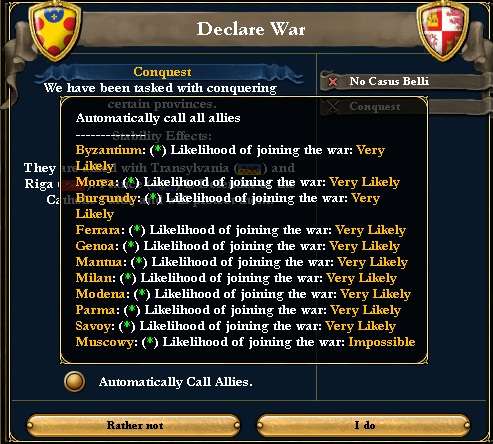
Leo III briefly considered his ruling on Iskander's fate. The truth was, in his own twisted way, Daoud was trying to serve the Empire, and he had never intended the death of his father. At the same time, however, he had betrayed confidential secrets. Perhaps he would learn loyalty and respect in the legions; he was at this very moment part of the Legio III 'Butterius'. General Butteri had very clear orders regarding his newest soldier. Iskander was assigned to a reconnaissance element, where he was almost assured contact with the enemy.
Marshal van Dijk entered the room, with a couple of maps under his arm. "With your permission, Emperor, I'd like to show you our opening moves."
The Emperor motioned for him to continue. "Here is our Eastern Theater."
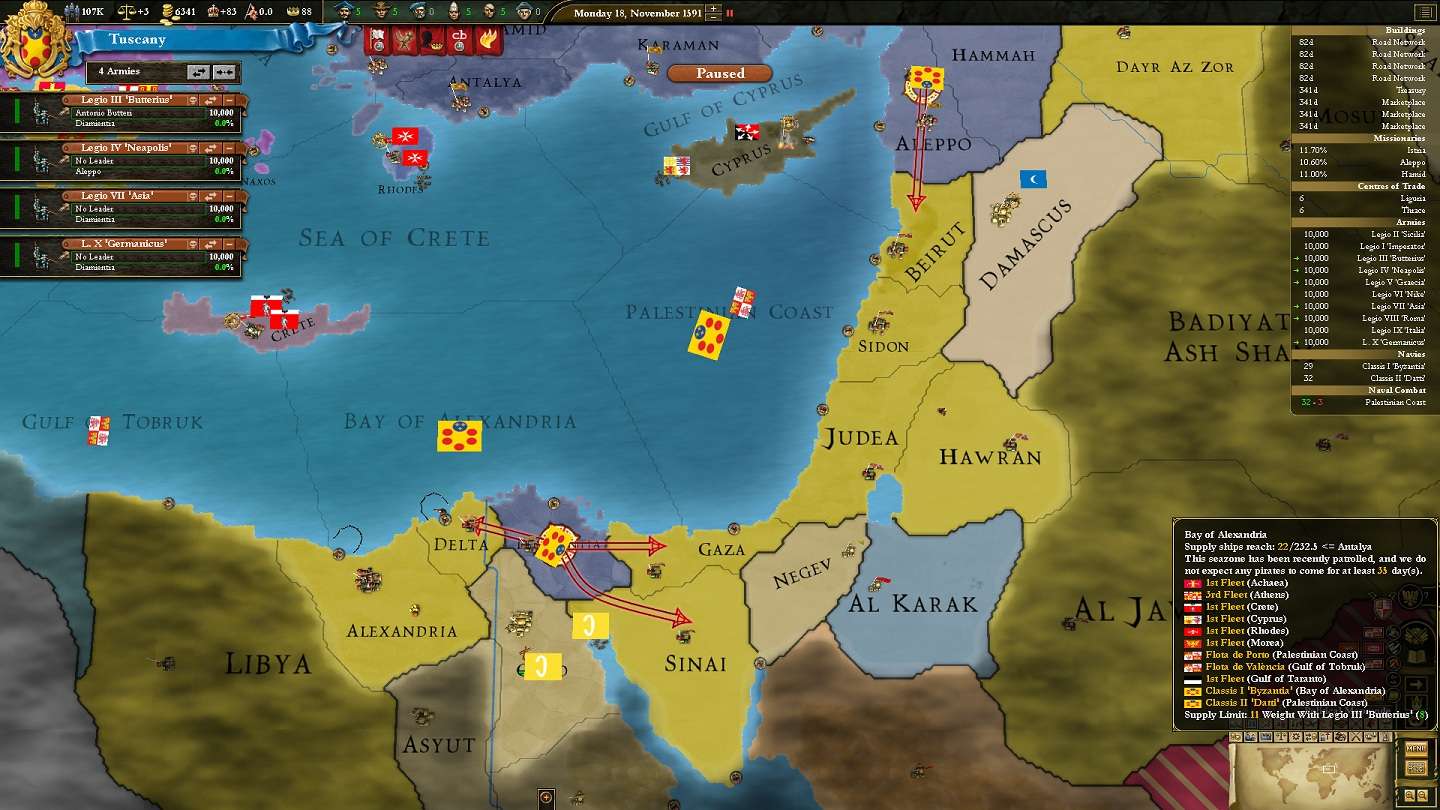
"The latest reports suggest no opposition nearby, so we will strike quickly. General Butteri has ordered his legions to spread out, seizing Gaza, Sinai, and Delta. The tenth Legion will move south, into Aleppo. These four Legions will secure the Holy Land and Northern Egypt as rapidly as possible. Next, the Western Theater."
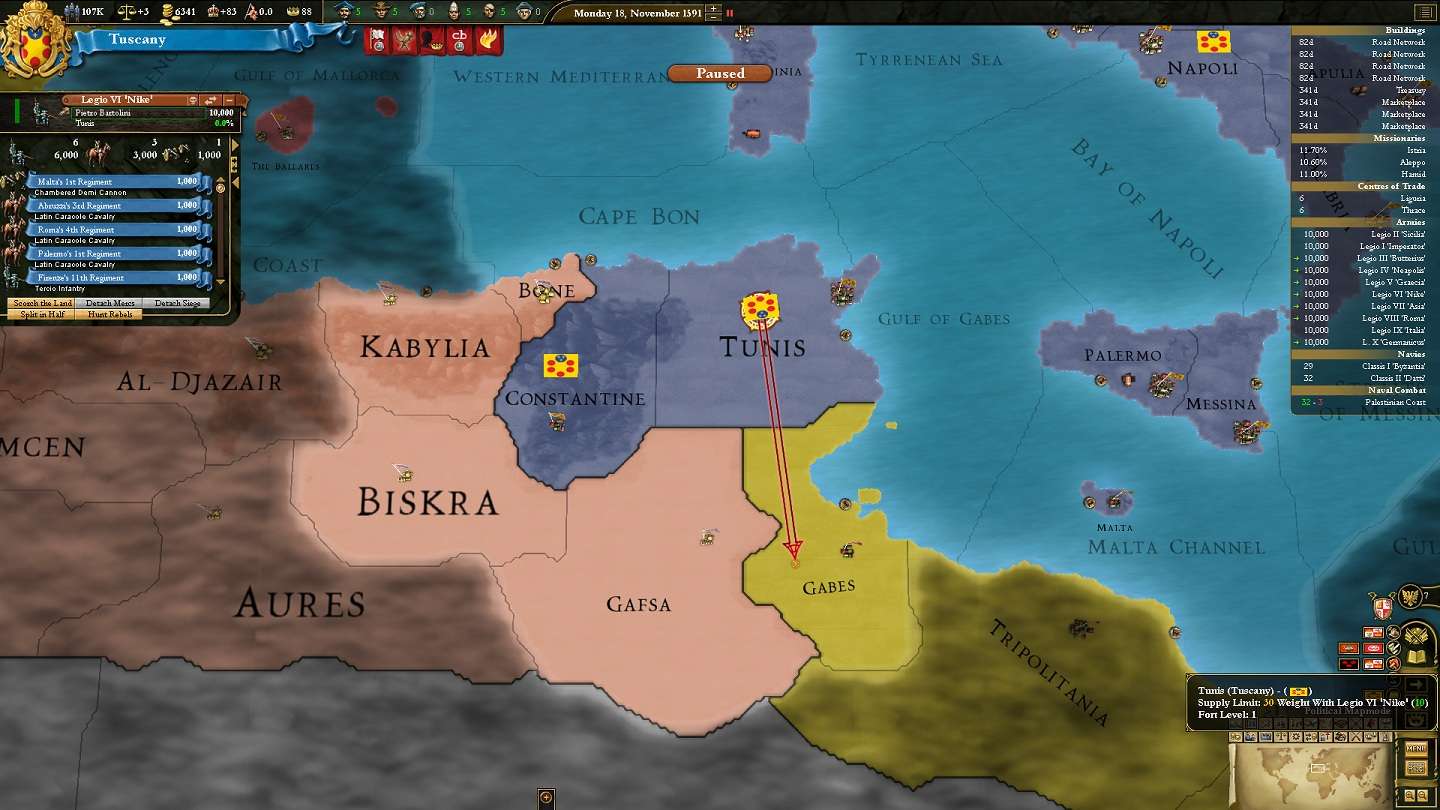
"Barring a surprise attack from Morocco, the Sixth Legion has orders to proceed east into Gabes and not to stop until he reaches Cyrenaica, which is currently a possession of Provence. All commanders have orders to take their cities as quickly as possible, using our siege equipment to reduce enemy fortifications. We have no reports, as yet, of the Castillian army. I suspect they are farther east, dealing with the Timurids, but I cannot confirm this at this time. Do you have any questions, Emperor?"
"One. What of our fleets?"
"For now, one will be kept near Judea. I've ordered the other -- the Classis I 'Byzantia' -- to sail west and blockade Tripolitania. I anticipate no resistance there, and they will transport the Sixth Legion elsewhere when their mission is complete. Eventually, we must consider an amphibious assault to capture territory in Hispania proper, but my understanding is that for now, we are to focus on North Africa and the Levant. Am I correct?"
"You are."
"Is there any word on whether any of Castille's allies will honor their call to arms? What of Muscovy?"
"We will know for certain tomorrow evening."
"Very good. If you will excuse me, I have a war to win."
"By all means. Godspeed, Marshal van Dijk."
--------------------------------------------------------------------------------------------------
16 December, 1591, the office of the Foreign Minister
As it turned out, Transylvania and Riga had honored the call of Castille, but France did not, a great boon that even Muscovy's abandonment was no great loss. Thanks to a very thorough spy network, Minister Barberini had strong estimates of enemy and allied strength.
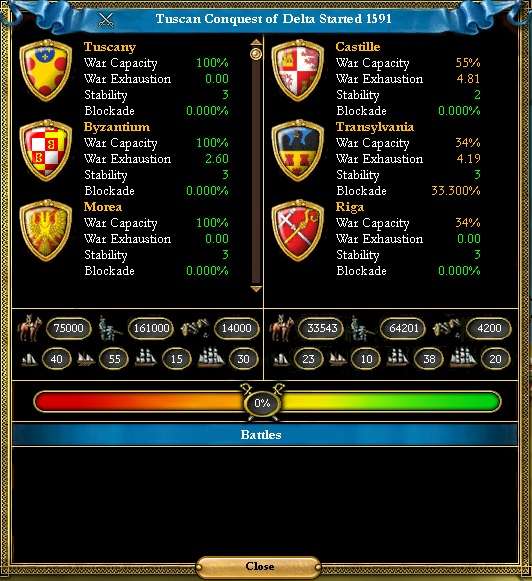
The good news -- perhaps the great news -- was that Castille was grossly outnumbered. However, Burgundy would likely not participate in the East, where the fighting would be toughest, and France would probably not grant passage to her bitter enemy, and so would not be able to participate in an overland invasion of Hispania.
The first blow was struck at sea. On 1 December, off the Palestinian coast, the Classis II 'Datti' destroyed an enemy fleet of 1 large ship and two light ships. It was hardly an even contest, but it seemed that Castille's navy would not be much of a threat either; Giovanni speculated that much of it was in the New World. Delta fell on 12 December -- the first of many such victories -- with the enemy armies nowhere in sight.
Not everything was going perfectly, however. Since Muscovy had not joined the war, Transylvania was able to menace Constantinople, and only one legion could be spared from the offensive in the east. Barberini prayed that the Byzantines could contribute a few regiments.
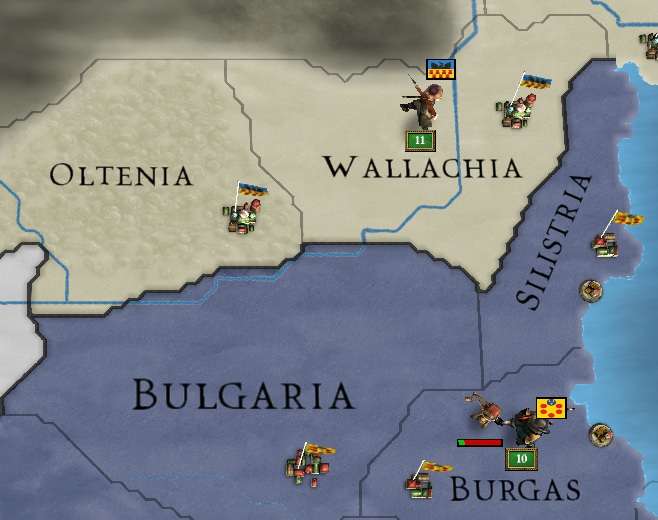
The best guess of Marshal van Dijk's men was that the first target would be Silistria. It was very trying to the men in Burgas to let the numerically superior Transylvanians siege wherever they wished, but the Marshal promised a bold plan to ensure the enemy's defeat.
The first days of the war had gone exceedingly well, but even a military novice like Barberini knew that the worst was yet to come. One question was on everybody's mind.
Where were those blasted troops?
--------------------------------------------------------------------------------------------------
20 December 1591, Bulgaria
The Commander of the VIII Legio 'Roma' was a remnant from Salvestro Pieroni's brief tenure as Marshal. He was a close friend to the ex-Marshal, but that was his only qualification to command. Marshal van Dijk hated leaving an important operation in the hands of a neophyte, but he could not spare his fighting generals. After consulting with the Emperor, a new Commander was chosen: the Marshal's younger brother, a mercenary captain named Jan van Dijk.[2] The Marshal didn't trust anybody else, and Jan was more than happy to work for his brother, provided the price was right.
Jan's orders were simple but bold.
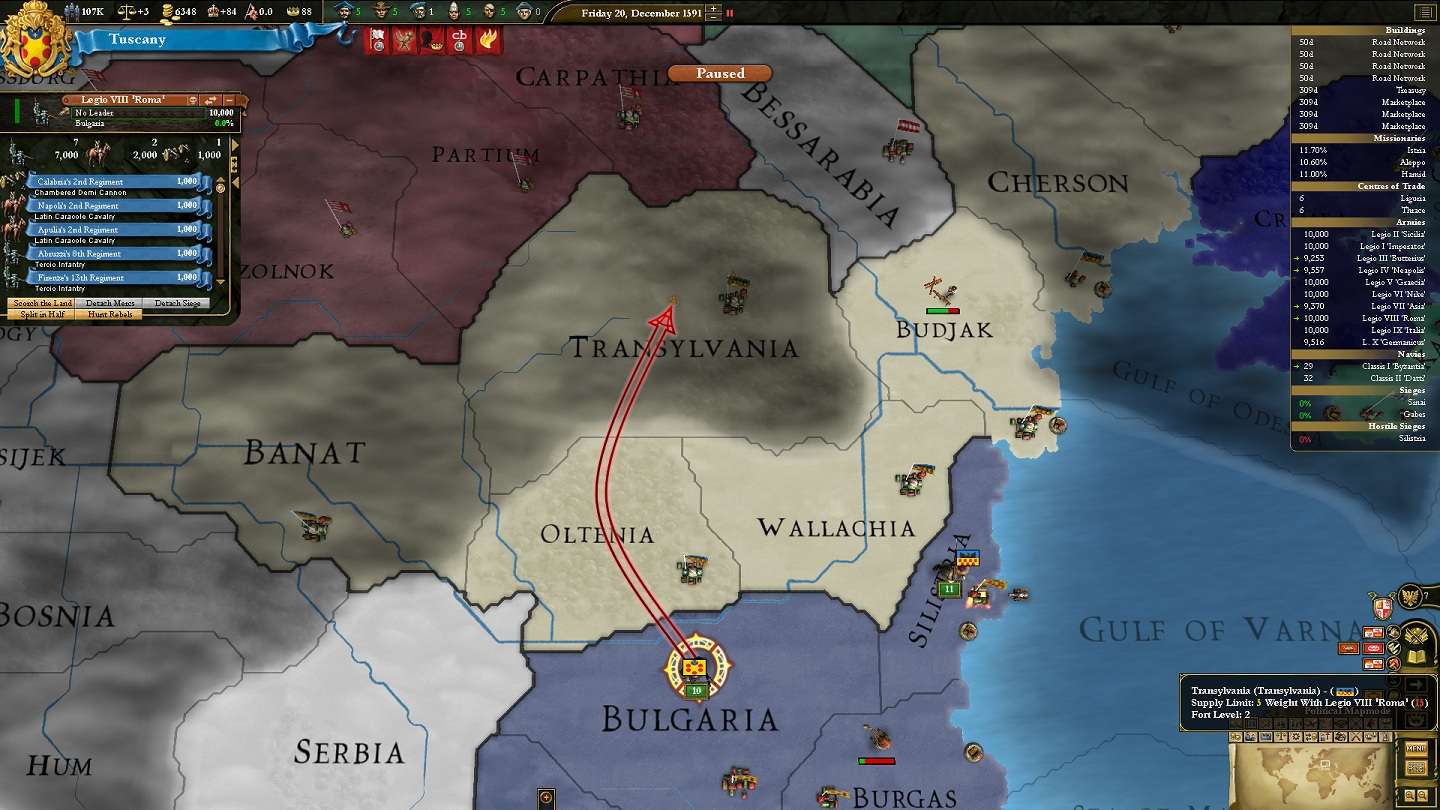
The Marshal knew that Transylvania simply didn't have the economy to have a large army, and that it was almost a guarantee that there would be no resistance. If Transylvania fell quickly, a white peace was a certainty, and the Emperor had no territorial ambitions in Transylvania.
Successes continued to pile up in the east: both Gaza and Beirut had fallen in the last week. It looked as if the war would be over in a few more months.
Such thoughts were mistaken. Gravely mistaken.
--------------------------------------------------------------------------------------------------
22 January 1592, Jerusalem
General Antonio Butteri was confounded. He'd been given authority to feel out the enemy's desire for surrender, but he still had yet to see a single soldier. Ordinarily, he'd be thrilled at his command's easy victories -- Sinai fell on Christmas Day, and Alexandria and Sidon by the 20th of January, but it seemed as if Castille didn't care.
Then it struck him. Nobody had really examined Castille's holdings in the New World, had they? As he looked at the map he'd brought along, his heart fell.

With their colonies in North America, South America, and Africa, it was no wonder that few of the territories thus far taken had made much impact. The only options available were to either defeat one or more Castillian armies or to invade Hispania. The New World was too far and he wasn't at all sure his fleets would survive a long transoceanic voyage.
Even his conquest of Judea felt a little hollow. The Castillian governor of Judea had been polite, but clearly expected relief sooner rather than later. Something was clearly in the works. Still, even if it was symbolic, the thought of Tuscany controlling the Holy Land made many happy.
A letter from the Marshal spoke of ill tidings to the north: Silistria had fallen to the Transylvanian army. Although not unexpected, since Butteri had been briefed on the plan, it still caused some consternation among the masses. One of his soldiers, a native of that province, had to be arrested and placed in a makeshift jail to keep from deserting.
He was actually impressed with his new "scout", the traitor Iskander. He knew the area very well, and more importantly, knew the people very well. He briefly fantasized about not having to waste three perfectly good soldiers to keep him from running, but since the dawn of man, politicians had placed unreasonable limitations on their soldiers. It was irritating, but not insurmountable.
The General turned to his map. Perhaps he needed to go further inland to provoke a confrontation with Castille...
--------------------------------------------------------------------------------------------------
1 February 1592, Judea
Daoud Selim Iskander originally thought his life would get better when General Butteri was transferred to the Seventh Legion in order to lead the attack. He was wrong. The new Commander of the Third Legion was a sadistic jerk that forced him to wear ankle weights in addition to the constant guard, so he couldn't run away. Worse still, his musket was taken away, so if he got into a firefight, he couldn't defend himself. Iskander knew he deserved to suffer for his atonement, but this seemed to be too much.
Gabes had fallen the day before, some of the soldiers heard. With Smyrna becoming a core territory, a couple of the sergeants speculated that the Emperor wouldn't be satisfied until all of Castille's land was part of the Empire. Iskander knew better, knew that until the Spaniards had the horrors of war visited upon them in their homes, there would be little or no chance of peace. The Latins were nothing if not stiff-necked.
All of sudden, he saw dust in the east. A lot of dust. He nudged one of his guards and pointed this out. The guard woke up the rest of the unit, and very quietly, they began to count regimental flags. 25 regiments were in the field! A runner from the unit ran back to the main camp with the information; it seemed all three legions would be needed to confront this threat.
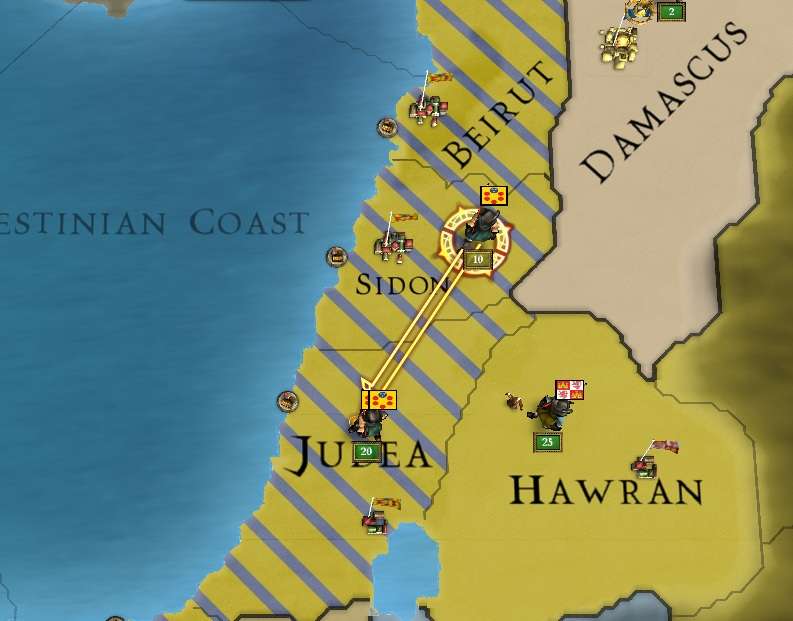
Battle would soon be joined, he thought. He hoped the runner got back to camp in time.
--------------------------------------------------------------------------------------------------
23 February 1592, Judea
General Butteri, for the first time in all of his years as a soldier, felt sick to his stomach. Yes, he'd won the battle, but the casualties had been horrific. The King of Castille himself, Alfonso XII de Trastamarta, led the enemy army. Although Butteri would put up his skills as a leader against any man, having the King present must have inspired his troops, as they put up one hell of a fight.
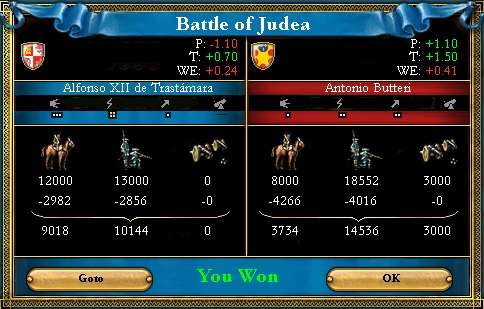
To make matters worse, another enemy column was spotted; this one farther north, in Dayz-Al-Zor. Only one Legion could oppose them. The Marshal dispatched orders to land the Legion from Constantine farther east, since the Moroccans made no signs of attack, but that would take a couple of weeks. He hoped that legion could stand fast.
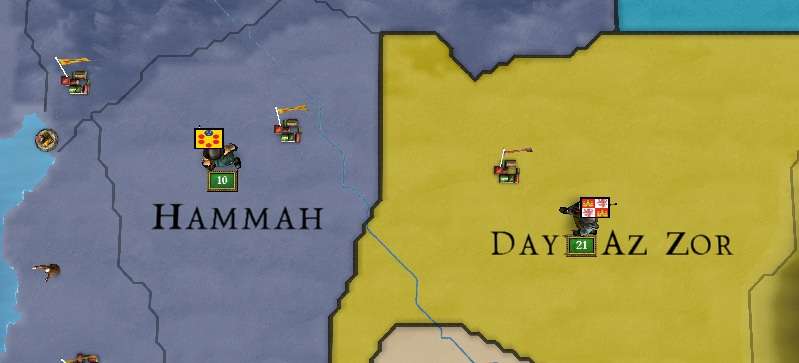
For now, his men had to lick their wounds, perhaps even get some reinforcements. They'd met the enemy head on, and the results had not been pleasant. There was no good defensive ground either. Only raw courage and skill would win the day.
He just hoped that next time, the price wouldn't be quite so high.
--------------------------------------------------------------------------------------------------
20 March 1592, off the coast of Valencia
With the fall of Libya, the Legio III 'Butterius' was racing east as quickly as they could for support, but General Pietro Bartolini, commanding the Legio II 'Sicilia' knew that, ultimately, the war would not be won in the east. It would be won in Hispania itself. He'd been preparing to land in Spain for three or four days -- it took a while for one legion to organize. His best intelligence indicated that his landing would be unopposed. Modena and Genoa had already besieged Pirineo and Girona.
Victory in the war rested squarely on him, he conjectured. The battle of Hammah was a disaster, and while the enemy column took some casualties, the V Legio 'Graecia' was a shell of its former self. Any attempts to flee to better defensive ground were almost certain to fail, since they were encumbered with artillery and the enemy was not.
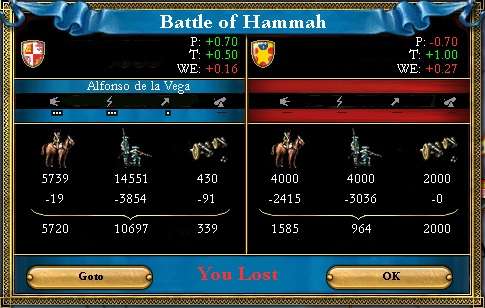
Only by racing for the enemy capital -- Madrid -- could he truly achieve success. [3]
--------------------------------------------------------------------------------------------------
1 May 1592, Mus
Tripolitania fell. The legions commanded by General Butteri were moving east into Hawran, and all reports suggested that General Bartolini was having great success in Valencia.
None of that mattered to the Fifth Legion. Only their artillery was in decent shape, and without reinforcements, that too would soon vanish.
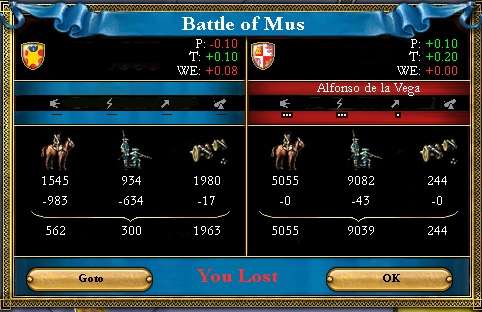
They got to Mus too late, and found the enemy already entrenched. They couldn't retreat, and the frontal assault was particularly brutal. The men were briefly cheered by the conversion of Istria to the Lutheran faith, making all the Italian provinces properly Protestant. Muscovy had signed a new alliance, but still refused to enter the war, and so this time the Emperor didn't even issue a call to arms. Rumors that another legion was sailing to reinforce them were unconfirmed, and many of the sergeants considered it false hope.
The black humor going through the camp now was that they'd better learn Spanish, since they'd be prisoners before too long. The Commander knew better.
The Spanish never took prisoners.
-------------------------------------------------------------------------------------------------
15 June 1592, Mus
While the Fifth Legion escaped safely to Erserum and began to entrench, relief finally came. The Third Legion was diverted to Mus, which had a convenient port, and fought a brave rear guard action to help extract the remnants of the Fifth.
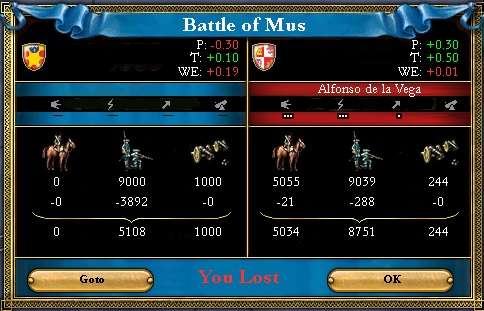
The Fifth Legion was safe, for now, but without a new game plan or a new leader, victory over even this small detachment seemed too unlikely.
That was the role of the new General of the Northern Theater; Innocenzo Ludovisi.
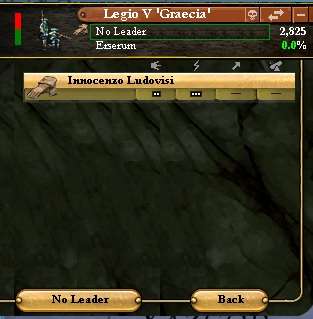
General Ludovisi had been a colonel on the Marshal's staff ever since van Dijk had come to Tuscany. Ludovisi was actually of Venetian descent; his ancestors had actually fought against Tuscany in the past. Ludovisi met Karel van Dijk in Holland looking for a new assignment. The fact was that Venice wasn't really a threat to anyone, and their army was a joke. Ludovisi hungered for real action, and after talking with the Dutch strategist, he became an integral member of van Dijk's staff. He'd learned much, and when the call came for a new General, the Marshal gave his blessing, complaining good-naturedly that he'd lost his best Colonel right after he was starting to be useful.
Ludovisi brought bad news with him as well. Although Libya had fallen, thanks to some clever maneuvering the Castillians had retaken Sidon. The three legions of General Butteri's command were chasing around the enemy soldiers, but were constantly falling behind thanks to the encumbrance of artillery.
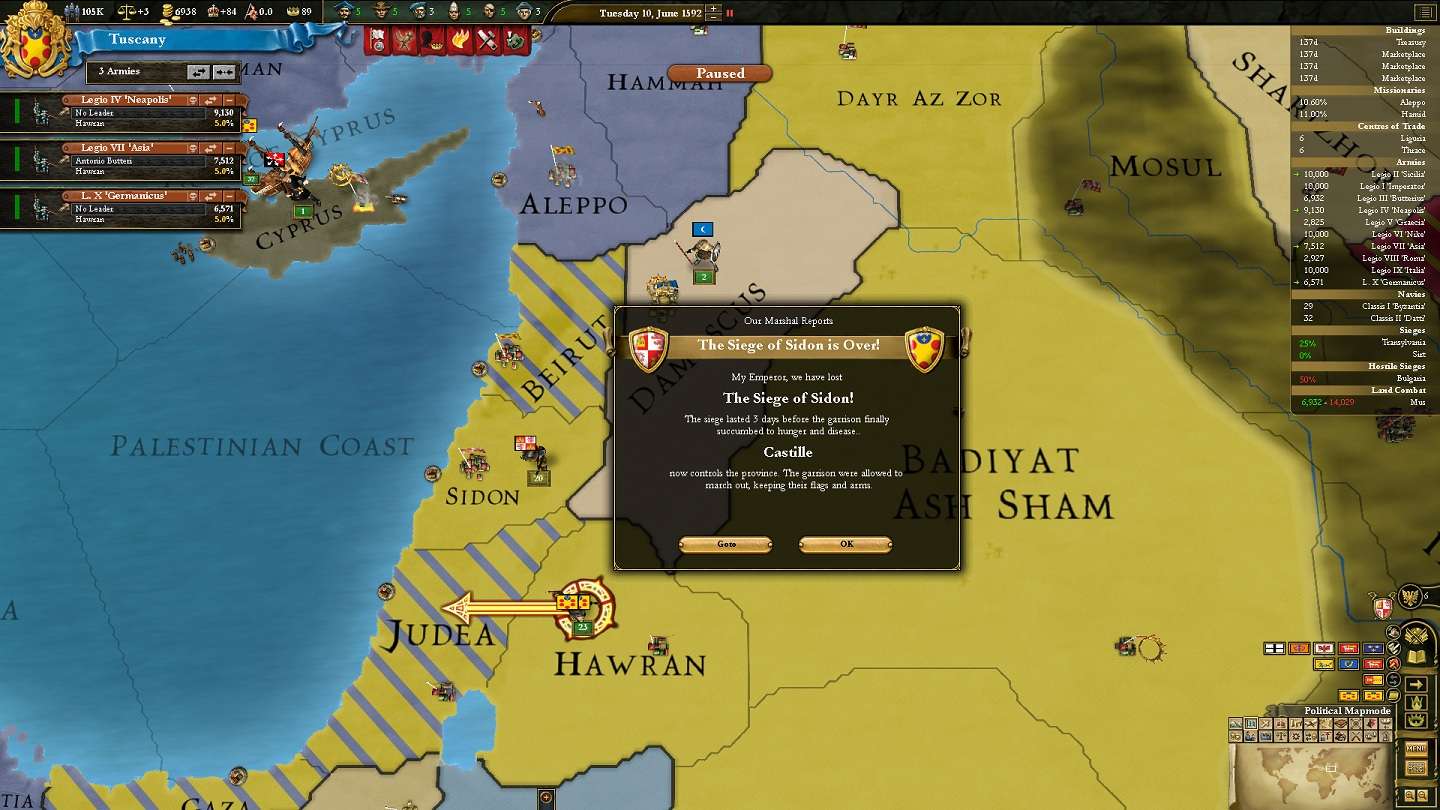
Innocenzo surveyed his command -- one recently wounded Legion and one that would need some months to be restored.
It would take a miracle, in his opinion, to turn around the fortunes of the eastern theater.
What he didn't know was that a miracle was coming, and from an unlikely source.
--------------------------------------------------------------------------------------------------
[1] Another bug thanks to the new patch. Muscovy is in an invisible war, I guess.
[2] I actually thought about making Marius Cato the commander. Then I realized he'd be over 130 years old! I really need to keep better track of my character's ages. So yeah, both he and Marcus are dead. I'll introduce their heirs in a future update, if they're important to the story. Unless they are, I'm not going to bother creating new heirs to the various Duchies.
[3] I must not play EU 3 enough -- I didn't realize Toledo was actually the capital until after the war was over :wacko:
Next update should be in a couple of days, which will feature the exciting conclusion to this war!
well even by your usual high standards that was brilliant ... utterly gripping from start to end ... applauds
well even by your usual high standards that was brilliant ... utterly gripping from start to end ... applauds
Thanks for the very kind words!
Maybe Delta should be renamed because it could have been the Danube or even the Rhine.
Great update, but don't you think it will all end in Tuscan tears?
Great update, but don't you think it will all end in Tuscan tears?
Maybe Delta should be renamed because it could have been the Danube or even the Rhine.
Great update, but don't you think it will all end in Tuscan tears?
Renaming Delta isn't a bad idea; I'd welcome suggestions on this front. As far as Tuscan tears, you're entitled to your opinion.
Finally catched up. Andreas was an awesome character, congratulations. I'm gonna read you Ukraine vic2 AAR trying to learn something(I suck badly at Vic) and your old Novgorod AAR.
Finally catched up. Andreas was an awesome character, congratulations. I'm gonna read you Ukraine vic2 AAR trying to learn something(I suck badly at Vic) and your old Novgorod AAR.
Thanks very much! One of our contest winners (History_Buff, I do believe) actually created Andreas. I've got enough characters for the moment, so I won't be needing any for the time being, but contests do happen semi-frequently.
I saw that he was created by someone, but you gave him life, I mean it, I really liked the character. Loved your novgorod save, learned a couple of things with it. I really prefer gameplay AARs, lol. Now I"m gonna try to learn how to play Vic2.
Chapter 26, part 2: Retribution achieved?
29 June 1592, Foreign Minister Barberini's office
Giovanni Barberini was of two minds about recent events. Although Beirut had been retaken by the Castillians, General Bartolini had won a victory in Madrid; not a major victory, but a decisive one, and the Empire of Tuscany needed victories.

Still, events in the east looked grim. The Tuscans were better armed, but slower than the more lightly-armed Spaniards. Barberini was worried. Not for Tuscany -- Castille had neither the ability or the inclination to invade the Italian peninsula -- but for Emperor Leo III. The Emperor had placed an awful lot of stock in this war and gaining significant land, an opportunity which might never come again.
That was when he finally noticed the unopened note on his desk. As he opened it, he knew the face of the war had changed, possibly for good.

Deus ex machina, anyone?
With the Mamluks and Syria in the war, the Empire now had unofficial allies. Although they would never openly work together, this meant more enemies for Castille to worry about in the Levant, which might take their attention away from the legions of Tuscany.
He had to tell the Emperor right away; it was some time since truly good news was heard in his chambers.
--------------------------------------------------------------------------------------------------
20 July 1592, Transylvania
Jan van Dijk, Commander of the Legio VIII 'Roma', had done exactly as his elder brother had commanded. The trouble was, the fortifications in Transylvania were much stronger than Karel had estimated, and the fact was that assaults had cost two-thirds of his legion.
He'd heard the new hotshot in the east, Innocenzo Ludovisi, had had no better success.
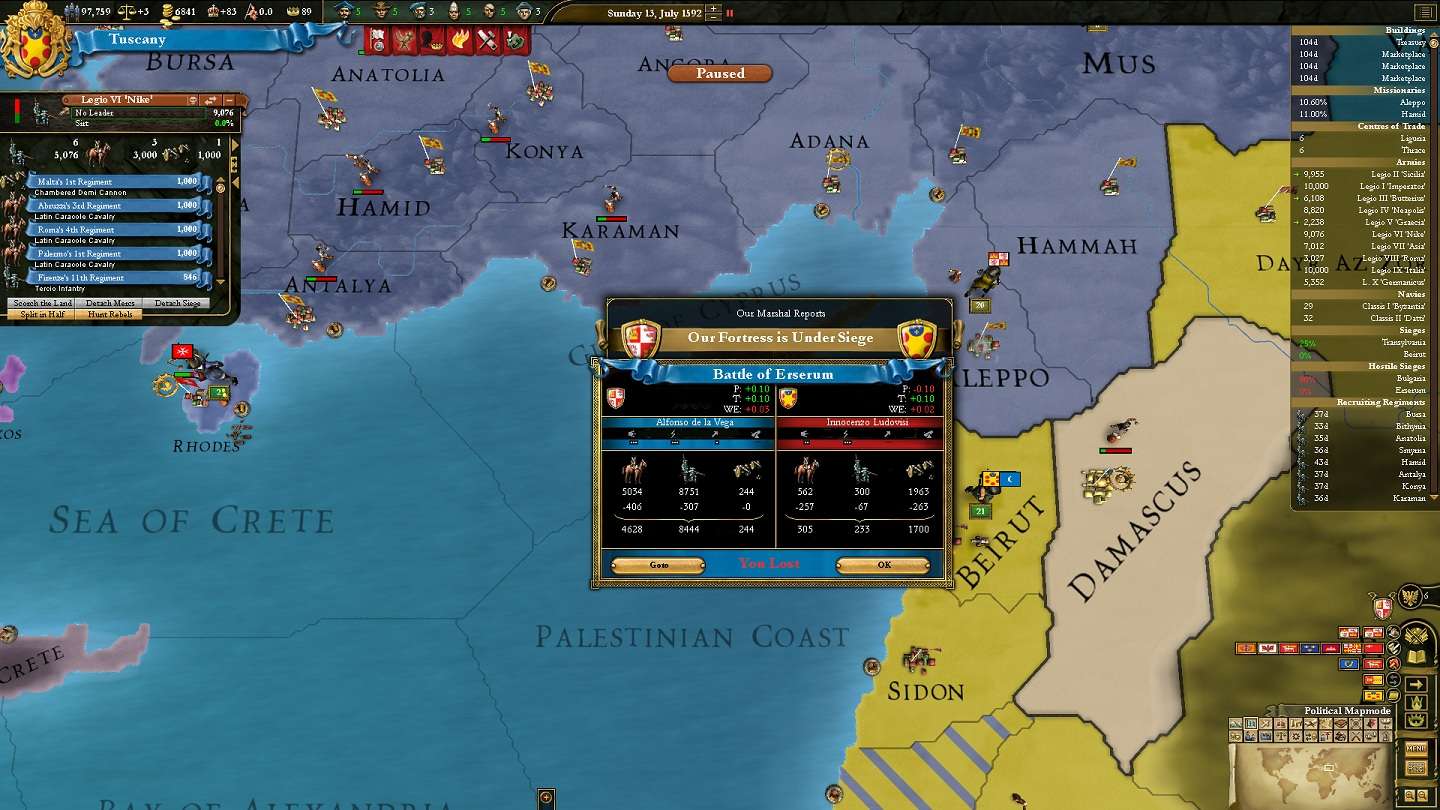
He groused for a moment about the unfairness of it all. He'd been commanding a legion almost since the very first day the war began, yet it was Ludovisi who was given the new General's job. Yes, he was a trusted friend to Karel, but dammit, Jan was his brother! The younger van Dijk simply didn't think life was fair. Although he was loyal to Tuscany (as loyal as any mercenary is to his employer), he couldn't help but smirk that the great and powerful genius had seen the same defeat as all the others.
Jan was contemplating another assault, when two foreign couriers galloped into his camp, almost at the exact same moment. As both demanded his attention, he pointed to the one who'd gotten there a fraction earlier. "What have you got for me, soldier?"
"I come from the Duke of Burgundy, Commander. He wishes to inform you he has engaged the enemy in Bulgaria and sends his compliments."
Jan pounded his fist onto the table with joy. "By God, that's wonderful news. How many men does your commander have?"
"18 regiments."
Another rigorous pounding of the table caused some of his aides to jump just a bit. He waved the map he'd just received enthusiastically.
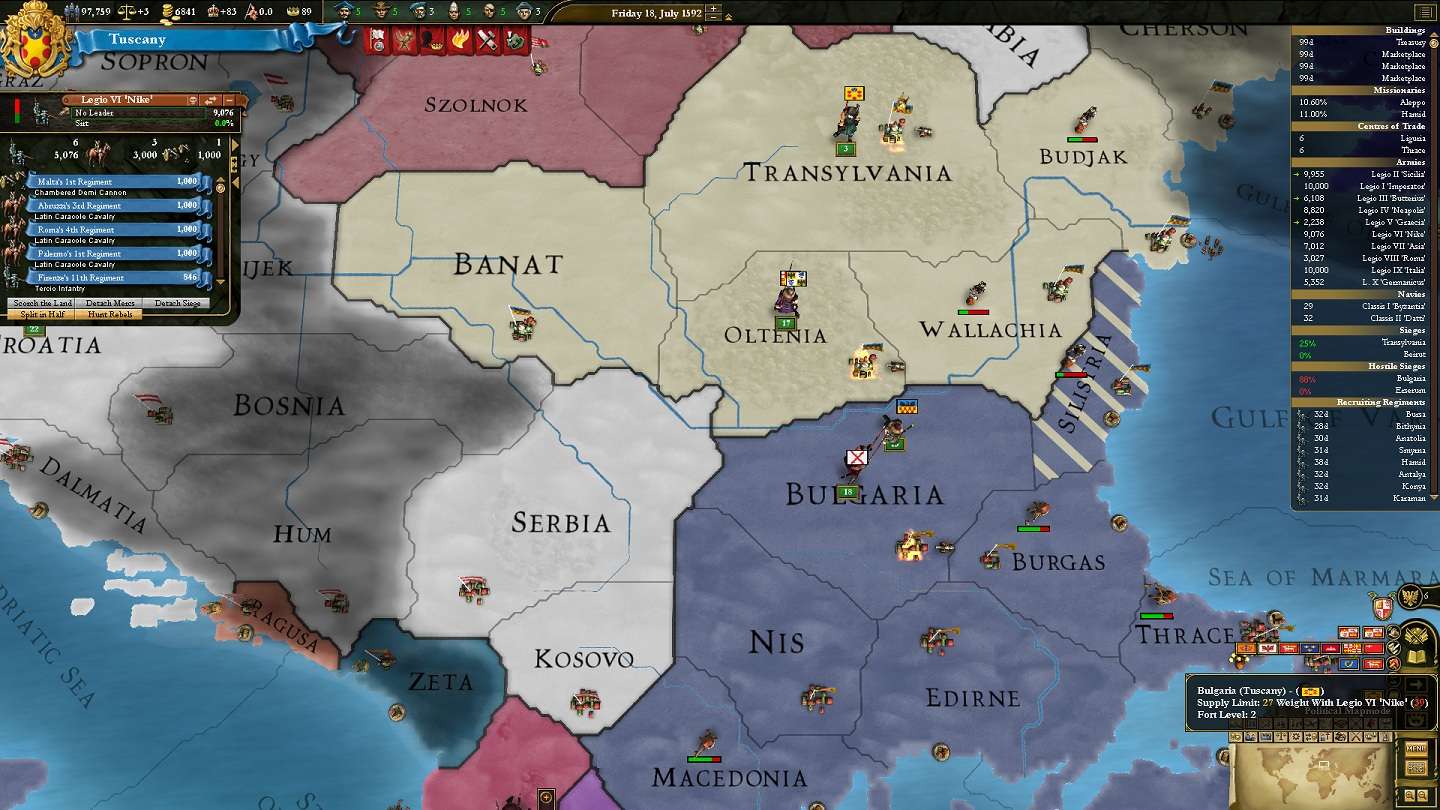
Just then, Commander van Dijk looked at the other foreigner, who was quietly sulking. "Beg pardon, I'd forgotten you. What news do you have?"
The second courier puffed himself up as best he could. "I am an emissary from his Holy Catholic Majesty, the King of Transylvania. We would have peace."
Van Dijk thought for a brief moment. He technically didn't have the authority to negotiate peace, as he wasn't a regular army officer. Still, he didn't think that his brother or the Emperor would mind. "Your Excellency, on behalf of the Empire of Tuscany, I accept."
The two shook hands. Commander van Dijk instructed the Duke's representative to report the news to his commander.
One front, finally, was over with. Jan thought that maybe he'd see some real action now, not some boring siege duty.
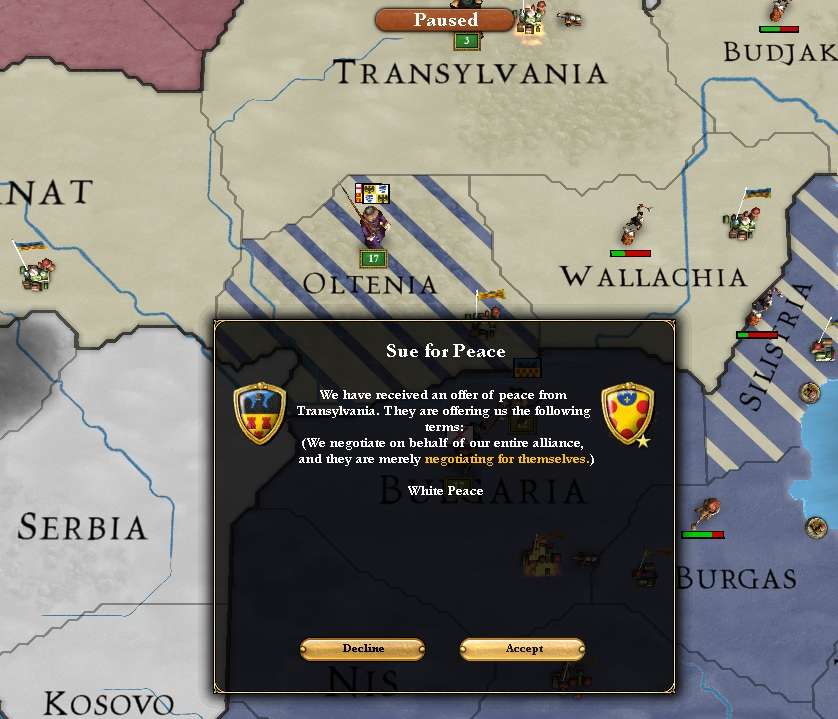
--------------------------------------------------------------------------------------------------
19 December 1592, Trebizond
A military theorist named Matteo Pierallini, the army reformer hired a few years ago, had published his first book on fortifications, a subject that might have been valuable to the impetuous Commander in Transylvania, now on his way south to Imperial lands.
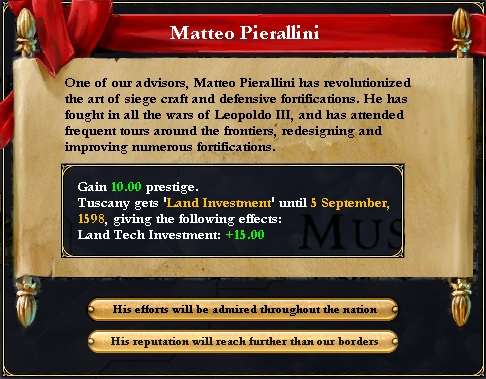
Although Pierallini was on the Imperial Council, he'd had almost no role in planning this war. Before the arrival of Karel van Dijk, the Emperor had considered naming him Marshal, but to be perfectly blunt, Pierallini was an academic. He didn't lack for personal courage, and still accompanied the armies more often than not, but he had little talent for command and almost none for operational planning.
As General Ludovisi perused the book, he was struck by an odd thought. For the first time in a long while, he actually had the time to read. For the time since the war began, Castille made a mistake. He wasn't sure why. Perhaps the reconquest of Judea made them overconfident. Maybe they feared the newest legion of the Imperial Army, the Legio XI 'Hispania." For whatever reason, instead of pressing the fight, the Spanish commander let him and his soldiers recuperate. Even better, the column of Burgundian troops arrived, and General Ludovisi knew he had a ripe opportunity. On the field of Trebizond, one of the two major Castillian armies in Europe was destroyed.
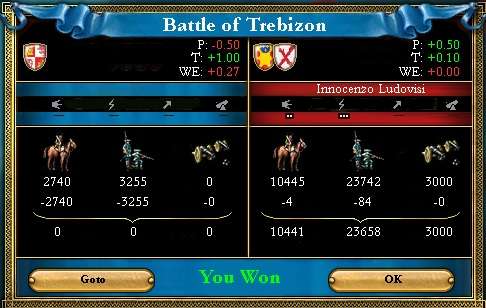
His colleague, General Butteri, had some luck as well; for whatever reason, the commander of the still fresh 20,000 troops that had taken Judea now diverted their attention to Damascus. With some quick diplomacy, Butteri had convinced the Syrians that he was no threat to them and asked only for safe passage to deal with the army of Castille. The Syrians gratefully agreed, and Ludovisi thought that another decisive victory could be coming soon.

General Bartolini had successfully taken Castillia la Vieja, and for a moment Ludovisi's mood soured. Because of his elder brother, the Commandant of the Germanicus Academy, Bartolini's name was constantly brought up as the hero of this war. Innocenzo snorted. Any idiot could take unoccupied territory, and he'd fought no forces larger than 1500 troops. His jealously lapsed, and he was instead grateful that the war was finally all positives. A few more months, he judged, and the war would be over.
--------------------------------------------------------------------------------------------------
6 March 1593, Sidon
Giovanni Ulivelli had heard stories of sudden promotions on the battlefield, but he wondered if anybody had ever been promoted as quickly as he was. He'd been a mere dispatch runner nearly two months ago. He'd been part of the Second Legion, under General Bartolini. He'd been arguing with the General to go after Toledo, but Bartolini had ordered a second Legion to take Andalucia instead. Giovanni recognized how important the Trade Center was to Castille, but with the capture of the King, the war might end all the quicker.
In retaliation, after the fall of Andalucia, Ulivelli, a staff Colonel, was sent east to deliver the news to General Butteri in person. This was out of sheer spite -- Ulivelli was well-known for his seasickness, and the voyage was the among the longest possible journeys. When he arrived in Aleppo, he found there was nobody there. A helpful citizen told him to proceed to Beirut, which was where the General was. He entered in the middle of a raging battle. Seeing one of the legions without a commander, Ulivelli took command out of pure instinct and flanked the enemy line, helping Tuscany win the bloody battle of Beirut.
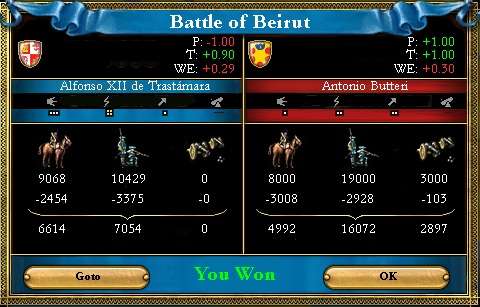
General Butteri noticed Colonel Ulivelli's brilliant move, and despite a lack of proper battlefield experience, made him his second-in-command, promoting a season veteran to command the legion Ulivelli once had. Butteri informed his new second-in-command that Castille was weakening; for the first time, they'd asked for peace. A white peace, which the Emperor would never stand for, but a peace nonetheless. Even though Syria was no longer at war with Castille -- they'd almost immediately signed a white peace -- Antonio knew that victory must be close.
After the Eleventh Legion recaptured Judea, there was only one unoccupied territory left for the Spaniards to retreat to -- Sidon. General Butteri let Colonel Ulivelli plan the operation, with only a little advice. Antonio recognized the inherent brilliance of his young subordinate and wanted to give him as much initiative as possible. With the battle plan complete, the 20,000 legionaries of Butteri's command engaged the now pitiful 12 regiments of the enemy.
The battle was far bloodier than the General expected. The first casualty was none other than Antonio Butteri himself; he was killed by a Spanish sniper. With the General dead, Ulivelli knew he was the only logical choice to continue the attack. The Battle of Sidon wasn't the glorious victory of Trebizond, but it was still a victory, and a fresh legion could be added to the Tuscan command.
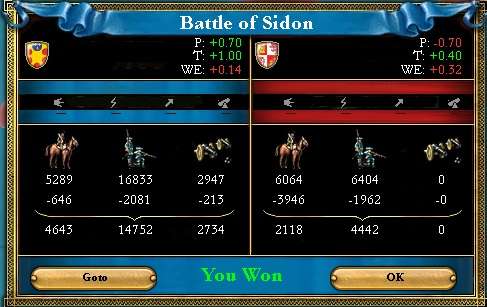
Acting-General Giovanni Ulivelli had to wait for an official promotion from Marshal van Dijk. It would come a week later, after he'd retaken Sidon. His first assignment was to put down a major rebellion that sprung up.
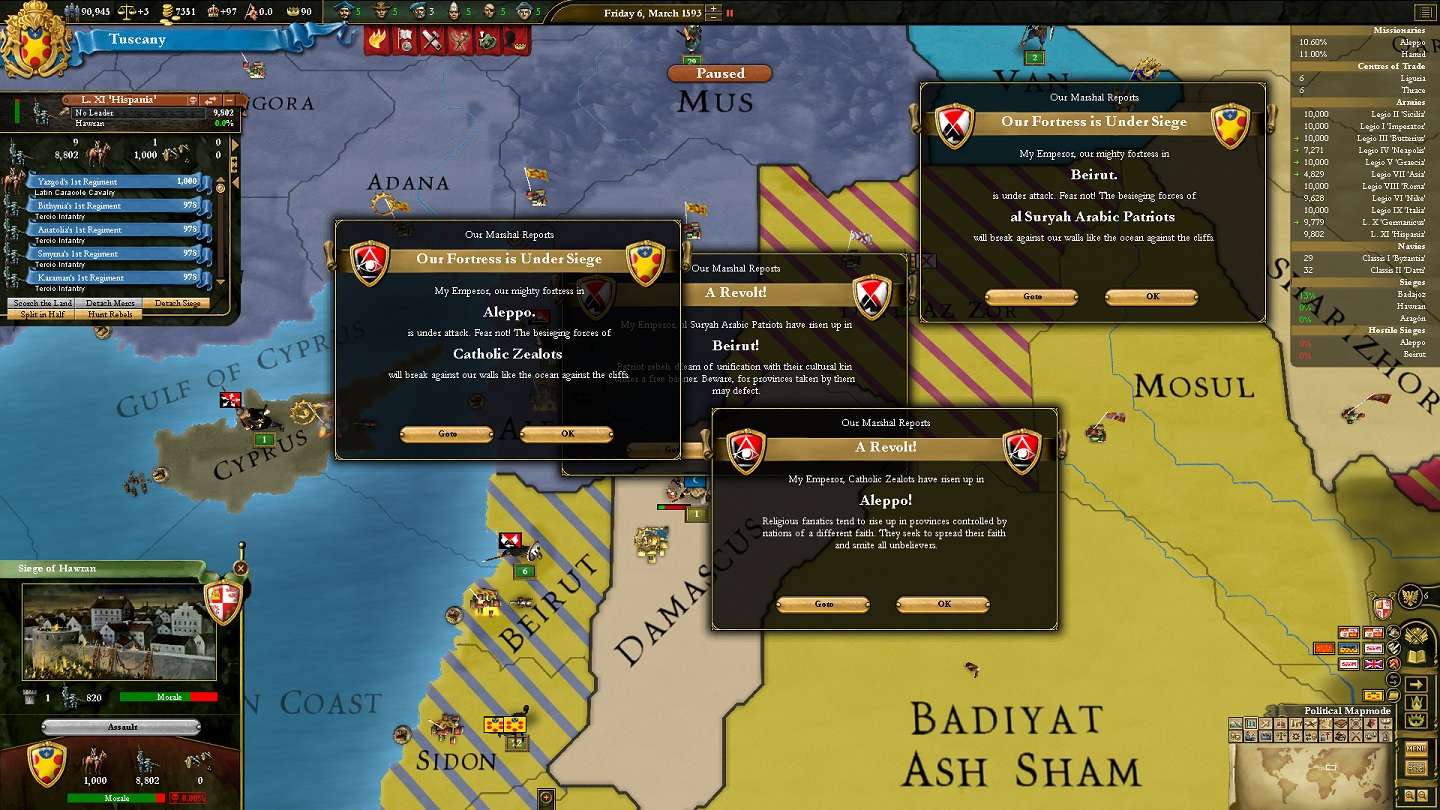
He worried that Castille might use this new threat to press an advantage, maybe even retake what they'd lost.
But for once, the slow pace of information worked for the Empire of Tuscany.
--------------------------------------------------------------------------------------------------
19 March 1593, Castle St. Maso, Rome
The King of Castille sat uncomfortably in the chair he was provided. With him was Juan Carlos Rodriguez. As the King eyed the young Lieutenant who'd started the whole war, it gave him just a moment's pleasure that at least Rodriguez's seat was much less comfortable. He'd probably be executed by the Tuscans, and good riddance, the King thought. He didn't know how the nobles back in Castille would take the loss of Andalucia and Madrid, but he had little choice. He was at the mercy of Emperor Leo III.
For his part, Leo III had had a long discussion with Chancellor Gathenhielm and Marshal van Dijk the night before the King arrived. The Chancellor wanted Andalucia, the incredibly valuable Center of Trade for Castille. Marshall van Dijk wanted to split Castille in twain. The Emperor's plan -- the ultimate winner -- was received with surprise. Eventually the Marshal came to accept the deal. Even Gathenhielm was pleased, since Tuscany did get a new Center of Trade, if a little less valuable than Andalucia. It was important to Leo III and the Chancellor that Axel agree; this was his last act as Chancellor, as he intended to retire to Sardinia, where he could spend time with his family.
As Leo III entered the room, King Alfonso XII rose. The King was determined to be seen as a gentleman, to appear gracious in defeat. The Emperor returned every courtesy and the usual pleasantries were exchanged. Still smiling a polite smile, Leo III shoved his version of the treaty across the table.
Alfonso XII was stunned. Although the Iberian peninsula was safe, the Emperor had the gall to demand most of Spanish North Africa and the Levant! The King was furious. This simply wasn't the way things were done! Leo III's reputation would be all but dead in Europe and the rest of the world. Such an act of infamy could not be tolerated.
Worse still, when he tried to pen a counteroffer, Leo III simply ignored it. When Alfonso XII asked why the Emperor could not see reason, Leo III's reply was simple and succinct.
"Your Majesty, if reason is what you were after, should you not have turned over the assassin in your midst? You had every opportunity to avoid this war. You only get one to end it. If you turn this offer down, I will simply resume operations. Sign it or don't. But this is the best offer you will ever see."
King Alfonso XII hemmed and hawed, tried every tactic he knew to get Leo III to reconsider, but all the Emperor would do was tap the treaty with a quill. Alfonso XII had taken a big risk, not extraditing the young Lieutenant. He'd thought he could win a war against this "Empire" that was barely larger than his own kingdom. Ultimately, the King knew he'd lost, and that things could have been a lot worse. With no alternative, he grudgingly signed his name.

"Thank you very much, your Majesty. I will send a copy to your embassy."
As Alfonso XII stormed out of the room, Leo III finally took a breath. His move had been extremely gutsy. With the uprisings in Aleppo and Beirut, the truth was, he couldn't have pushed any farther in the east. The Emperor never had any intentions of taking anything other than North Africa. The Holy Land was in Protestant hands. The Nile River Delta returned to its ancestral owner. Alexandria, the booming market place, also belonged to the Empire now.
As he entered the chamber next door, the nobles of the Empire of Tuscany, all of whom had gathered for this occasion, stood and applauded thunderously. Not many Emperors had expanded the Empire this much in one war. Leo III actually blushed, just a little, but not enough that anybody noticed.
"Thank you, my friends. We have triumphed, and brought my father's murderer to justice. The wealth of our new lands shall enrich all of our citizens, and the former subjects of Alfonso XII will flourish under the Empire of Tuscany. It is a glorious day for all of us, and we will celebrate properly after a few moments.
"We do have some new lands to distribute, however. I am pleased to announce two new Dukes, who will swear fealty after our meeting. First, the Duke of Jerusalem shall be the man that kept our troops fighting after one of the great heroes of this war fell on the field: General Giovanni Ulivelli. His lands will include Beirut, Sidon, and Judea.
"We also have some lands in North Africa to distribute. The lands stretching from Tunis east to our border with Provence in Cyrenaica shall belong to General Pietro Bartolini, our new Duke of Carthage."
Some of the nobles gathered expected an objection from Drusus Germanicus. After all, his family had been promised all lands in Africa, but they noticed that Drusus Germanicus wasn't actually paying much attention. The Emperor's next words explained why.
"I have one final piece of news. Axel Gathenhielm III, the Duke of Istria-Sardinia, has served in our Empire for many years. Since Gaius Andreas Germanicus is now old enough to take over as Archduke of Egypt, his father, Drusus Germanicus, will serve as Chancellor. The redefined Archduchy of Egypt will include all the lands from Libya to Gaza. If we expand south, those lands will be his as well. I've already gotten agreement from Archduke Germanicus. The whole of Africa is too much for one man to rule, and we must recognize our brave Generals.
"Speaking of which, General Innocenzo Ludovisi is being named Archduke of Asia Minor, with the unfortunate demise of former Marshal Salvestro Pieroni."
Everybody looked uncomfortable at that. Pieroni had never fully recovered from his failure at Sardinia in the war with Morocco. His father, the wealthy merchant, was so disgusted with Salvestro's failure that he disowned his son. When Pieroni's name was nowhere on the rolls of potential commanders for the War of Retribution, he took his own life. Ludovisi even looked displeased. Yes, he was an Archduke now, and one of the more powerful ones. His lands stretched to Aleppo in the south and the Turkish straits to the west. As the nobles rose to left, Drusus Germanicus whispered in the Emperor's ear. The Emperor, caught by surprise, nodded and motioned to the new Chancellor.
"I am sorry to keep you, my lords and my Emperor, but there is one last piece of business that must be attended to. Guards, please bring in Daoud Selim Iskander."
Daoud stood upright as he entered between two guards. He'd arguably undergone more hardship in the war than any other man. He felt he'd earned the right to walk with pride, as he had fought honorably. The Chancellor then turned to address the new addition to the room.
"Daoud, you committed a terrible crime that resulted in the death of our beloved Emperor, Francis I. Your sentence was to fight for your freedom, so to speak. As a condition for my acceptance of my new post, I asked that I be allowed to make the final decision on your fate. I've spoken with all of your commanders."
Daoud, although proud, couldn't help but flinch just a bit.
"Each and every one thought that, under different circumstances, you could have been promoted to the rank of Colonel, if not higher for your exemplary bravery. One of the highest principles of Christianity is forgiveness, and with the Emperor's consent, forgiveness is your reward. Let me explain what that means.
"You are free to travel anywhere you like in the Empire. You may even leave, if that is your wish, and pursue your fortunes elsewhere. You will go with our thanks and a suitable reward for your bravery. We would be delighted if you could continue to serve the Empire. You will never earn a patent of nobility or reach as high an office as Foreign Minister ever again, but you could either remain in the army or work under Minister Barberini translating documents and dispatches. Should you have children, they will be treated no differently than any other citizen of Tuscany. However, if you choose to serve, for security reasons, you will not be allowed to leave Rome or wherever you end up without an escort until such time as the Emperor is satisfied your loyalty and ability to handle sensitive information is restored."
Iskander had fully expected to be killed, even after his service in the army, and would not have objected had that happened. What Drusus Germanicus was offering was far better than he thought he deserved. He had his pride and dignity back, and he expected to die with both. As he considered his options carefully, he made his decision.
"Chancellor Germanicus, you are very kind to make this offer to me. There is only one place I could possibly go; if you and the Emperor will allow it, I would go to Jerusalem. I would be happy to serve Duke Ulivelli in any role he saw fit; he was very fair to me, and I have a great deal of respect for his accomplishments."
The Chancellor turned to the Emperor, who with a single nod granted Daoud Selim Iskander the only gift he'd ever wanted, the gift he'd prayed for since he was a boy.
He was going to the Holy Land, a Holy Land that was now protected by the most powerful nation on Earth.
The Empire of Tuscany.
--------------------------------------------------------------------------------------------------
That war went pretty well, I'd think. For those who care about such things, since I'm on Very Easy, I have an infamy limit of 56 -- this only puts me at 41.
I'm going to hold off until this weekend to update, but I'll give you two updates -- the rest of the 16th century and the 1600 update.
Join me then for more exciting adventures, including some new lands I never intended to have but couldn't refuse!
I saw that he was created by someone, but you gave him life, I mean it, I really liked the character. Loved your novgorod save, learned a couple of things with it. I really prefer gameplay AARs, lol. Now I"m gonna try to learn how to play Vic2.
Very high praise, and I thank you for it.
The decision of the Mameluks to feast on Castille's carcass was pretty handy timing for you, but that was a successful war and really consolidates your power over the central and eastern Med regions. Good to see the court is still capable of serious intrigue though.
That's a lot of infamy to burn off.  Hopefully that doesn't lead to some uneventful updates, although your updates are never dull to me.
Hopefully that doesn't lead to some uneventful updates, although your updates are never dull to me. 
It's unfortunate that Axel is retiring now. I was hoping he would set a new age record and be Chancellor for another century.
It's unfortunate that Axel is retiring now. I was hoping he would set a new age record and be Chancellor for another century.
The decision of the Mameluks to feast on Castille's carcass was pretty handy timing for you, but that was a successful war and really consolidates your power over the central and eastern Med regions. Good to see the court is still capable of serious intrigue though.
The best part was, the Mamluks didn't get anything, and my conquests keep them from going inland.
That's a lot of infamy to burn off.Hopefully that doesn't lead to some uneventful updates, although your updates are never dull to me.
It's unfortunate that Axel is retiring now. I was hoping he would set a new age record and be Chancellor for another century.
It won't be dull, at least not the next one. After 1600, now... I think I got too excited with characters a while ago (around Leo II maybe?) and I forgot who was how old; I figure it's better to have fewer well developed characters.
Time to burn some infamy...
Holy Infamy - infamy you got for taking the Holy Land
This is the problem with using Conquest as your CB; I really, REALLY wanted to take some land in Iberia, but the infamy was too great. It's still going to be a while until I get Unam Sanctam (which is NOT my next NI, BTW), and I figure, if I can burn some infamy, I'll use Holy War on the Mamluks and Morocco to take the rest of Egypt and North Africa.
Truth be told, I may not bother with US, since (if you remember) I modded empires to include Imperialism (which always seemed silly to me, in retrospect). If my mod fails, however, that's the next step.
I like the characters myself. They make the AAR that much better and make it an entertaining read even when there are no wars going on. However, with the vast ammounts of territories being given to the New Dukes and Archdukes, some of the old line aristocrats, like the Ciceros and the Catos, seem to have become small fries by comparison, as their holdings are quite small in retrospect. The Duke's of Jerusalem and Carthage and the Archduke of Egypt and Asia Minor as well as the Archduke of Constantinople seem to be the most important men in the country after the Emperor and the Cicero's and Cato's and their ilk seem to largely have been eclipsed.The best part was, the Mamluks didn't get anything, and my conquests keep them from going inland.
It won't be dull, at least not the next one. After 1600, now... I think I got too excited with characters a while ago (around Leo II maybe?) and I forgot who was how old; I figure it's better to have fewer well developed characters.
Last edited:
Oooh, go Tuscany go!
any chance of a map of your eastern holdings?
I'll have one in the 1600 update; I'm not quite done expanding yet!
I like the characters myself. They make the AAR that much better and make it an entertaining read even when there are no wars going on. However, with the vast ammounts of territories being given to the New Dukes and Archdukes, some of the old line aristocrats, like the Ciceros and the Catos, seem to have become small fries by comparison, as their holdings are quite small in retrospect. The Duke's of Jerusalem and Carthage and the Archduke of Egypt and Asia Minor as well as the Archduke of Constantinople seem to be the most important men in the country after the Emperor and the Cicero's and Cato's and their ilk seem to largely have been eclipsed.
I do too, no question. I don't like having too MANY characters, because then it's hard to keep them straight
Quick question: Is Venice part of the HRE or not?
I'll have one in the 1600 update; I'm not quite done expanding yet!
I do too, no question. I don't like having too MANY characters, because then it's hard to keep them straightYou've got a good point with the older families, the Ciceros and the Catos, but keep in mind that the Archduke of Constantinople is no more; the Prince is now the ruler of Constantinople. However, whenever Milan decides to behave and get inherited, they will be beneficiaries.
Quick question: Is Venice part of the HRE or not?
No it is not. Unless it has joined since the start of the game, it is not a part of the HRE.

